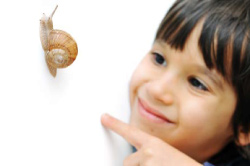Children in their developing years are keen learners. They are curious about everything that occurs around them. Whatever they see, hear and smell are all like mysteries waiting to be unveiled. Curiosity is simply their natural desire to learn, explore, discover and understand things.
Be Curious, My Child
A curious child will continue to explore and learn, probably well into his adulthood. Therefore, supporting your child’s natural ability to be curious will help him become a life-long learner. Moreover, during the process of discovery, your child has the chance to develop his creativity and learns to solve problem on his own.
As a parent, you can provide opportunities and an environment to help nurture your child’s curiosity:
- Frequently expose your child to new knowledge and experience through reading books, participating in outdoor activities and playing various games.
- Encourage your child to question if he has doubts or queries, and guide him to finding the answers. You’ll want your little learner to be not afraid of asking and testing out new ideas.
Ways to Encourage Your Child’s Curiosity and Learning |
|
Nature Museums, zoos and aquariums Games |
From Fascinating to Frustrating
While trying to encourage your child’s natural ability to wonder and question, you may at times find those why’s and how’s annoying, especially when you’re busy. You may also feel uncomfortable answering some questions, or frustrated if you don’t know how to answer.
However, be careful not to brush away his curiosity too quickly by shutting him up or ignoring his questions. Curiosity can be easily killed with responses, eg ‘don’t disturb me’ or ‘don’t ask’. Squashing your child’s curiosity too frequently may hamper a critical early childhood learning process.
There may be a reason behind those endless questions, such as trying to seek your attention, or not satisfied with the answer provided. Whichever reason it may be, you can try the following ways to handle the different situations.
- If your child repeatedly asks the same question, ask instead if he knows the answer. He’ll probably answer his own question and stop at it. Sometimes he just wants to have your attention or approval.
- If you’re busy, say so and tell him that you’ll get back to him later. Simply dismissing your child or ignoring his questions often lead him to finding his own answer that may be misleading.
- If you don’t have the answer, be honest and tell him you don’t know or that you’ll find out and share the answer with him later. Always tell it in a proper manner; otherwise he’ll never stop asking.
- When dealing with questions that are difficult to answer, ask for some time to think about it. This allows you to plan the best age-appropriate response for your child. Don’t lie to your child; if he finds out he may not believe in his parents anymore.
- You can also encourage your child to seek answers for himself by going to the library, or by getting help from other family members or school teachers.






Comments